 Hermes (Mercury) Greek God - Art Picture by Neffo
Hermes (Mercury) Greek God - Art Picture by NeffoHermes (Roman equivalent is Mercury) is one of the oddest, most gifted, and most popular Olympian gods. He is son of Zeus and Maia, driver of the living and dead, preacher and messenger of the gods, protector of young, shepherds, athletes and thieves. Hermes was the god of transitions and boundaries. The birth of the competent and inventive god took place in Arcadia and more specifically at mountain Kyllini.
There, in a cave, lived secluded one of the seven daughters of Atlas and Pliionis, the shy Pleiades Maia. The flirty Zeus spotted her in this cave and mated with her. In this cave, ten months after, the immortal nymph brought to the world the fruit of her love with Zeus, the small and miraculous Hermes.
From the very first day of his birth, Hermes began to excel. Taking advantage of the absence of his mother, he jumps off the swing and goes out of the cave to play. In his exodus, he stumbles into a turtle. Impressed by the little animal, he gets it, turns it upside down, empties the shell and using stretched calfskin, he covers the top open part of the shell.
On two reeds that are well-adapted to the shell, he secures seven strings (from sheep intestines) and produces a wonderful musical instrument.
The small Hermes is not left empty-handed towards this amazing invention. He takes a stick and starts improvising, singing about the love of his father and mother.
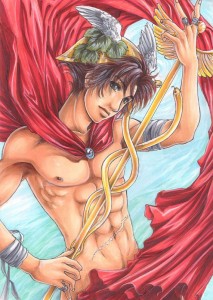 Hermes (Mercury) Greek God - Art Picture by Kukki_chan
Hermes (Mercury) Greek God - Art Picture by Kukki_chanBut his new occupation quickly stops filling him. Tired and with an intense sense of hunger, Hermes is trying to find ways that will fill his empty stomach. He decides to leave Arcadia and ascend to the north.
Having covered a great distance, within a very short time, the little god arrives with sunset near Pieria. There was the feeding ground of Apollo’s flock, which Hermes wanted to steal.
Having quickly picked fifty heifers, the wily god puts his cunning plan into effect. In order for the footprints of animals to not to be revealed, he mixes and shuffles them and carries his new flock safely in the Peloponnese. So, the trick with the inverted footprints and the darkness of the night favored the plan of Hermes.
Going down to the south, near Boeotia, the little god was seen by an elder while he was cultivating his vineyard. Hermes was not intimidated at all by the meeting with the older farmer. With the rigor and flamboyance of an important man, he demanded his silence and casually continued his journey downwards.
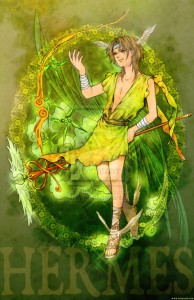 Hermes (Mercury) Greek God - Art Picture by zelda994612
Hermes (Mercury) Greek God - Art Picture by zelda994612By daybreak he arrived in Pylos. Once he picked and slaughtered two heifers to satisfy his hunger, Hermes hid the rest of the herd in a barn. Cutting the meat into twelve pieces (one for each Olympian god) and lighting a fire with some trick (rubbing specifically a branch of laurel), prepared the pieces for sacrifice. The intelligent god completed very fast what he had prepared and planned. Being tired by the tension of the day, he returned to the cave, went like the wind through the keyhole and returned to his crib.
The very next day, Apollo discovered the loss and understood that it was a thievery. As god of divination, he guessed how the thief could have acted and decided to find him and take revenge.
He descended to the south and luckily, while walking on the road, he met the old man who had seen Hermes the day before. The confirmation of his suspicions is a fact. Apollo, being enraged, reaches Kyllini and begins to accuse his little brother to his mother. Hermes does not remain silent in front of the barrage of attacks from his brother. He takes a defensive stance on the allegations and strongly protests. He even proposes that the two of them should climb to the Olympus to solve the dispute with the intervention of their father Zeus.
 Hermes (Mercury) Greek God - Art Picture by Zeldacw
Hermes (Mercury) Greek God - Art Picture by ZeldacwIn Mount Olympus, Zeus is astonished from the cunning and impudence of his little son. He admires his ingenuity and is amused by his antics. Listening to the grievances of both his children, he advises and manages to reconcile them.
The initially mischievous Hermes is convinced by his father's words and decides to return the heifers to Apollo. Additionally, in order to calm him, Hermes plays improvised music with his lyre.
Apollo is thrilled and bewitched by the invention of his brother and requests it as a gift.
Hermes does not refuse his request. He gives the lyre to his brother, but asks in return the herd of heifers that has been stolen.
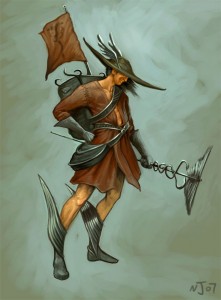 Hermes (Mercury) Greek God - Art Picture by TaekwondoNJ
Hermes (Mercury) Greek God - Art Picture by TaekwondoNJApollo welcomes the proposal of Hermes and in gratitude gives him the herd, then the stick of wealth and happiness, and finally the privilege of divination (which until then was held by Thries, three winged virgins).
The feud between the two brothers ends successfully with their commitment to eternal support, love and friendship. The sly and shifty Hermes quickly wins the favor of the other gods.
First of all, Zeus appoints him as his preacher and negotiator. Confident about his cleverness and cunning, he gives him the winged sandals and entrusts him to confidential and critical missions.
Hermes, flying over land and seas, conveys Zeus’s intentions and on the other hand he announces news and events to him. As a tireless runner and as fast messenger, he always offers his services, mainly, to the other gods.
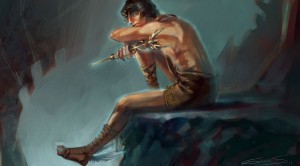 Hermes (Mercury) Greek God - Art Picture by Lagro Ross
Hermes (Mercury) Greek God - Art Picture by Lagro RossHades, like Zeus, soon realizes his abilities. He hires him to his kingdom and instructs to him the call and transfer of the dead to their new home. Hermes, with the jurisdictions that Hades offers him, is the only god who crosses and acts in the three worlds: in the sky, in earth and in the Underworld. In most mythological themes and incidents, Hermes takes place with the three most basic properties: the messenger, the soul carrier and the companion and protector.
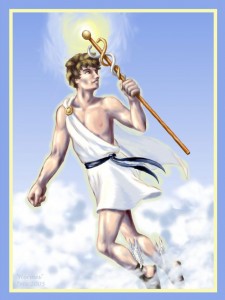 Hermes (Mercury) Greek God - Art Picture by DeitiesOfMyth
Hermes (Mercury) Greek God - Art Picture by DeitiesOfMythMany myths attest his abilities, skills and tremendous power and usefulness. During the War with the Giants, wearing the cap that made him invisible, Hermes kills Hippolytus. At the same time he helps his father, Zeus, in his confrontation with Tyfoea. After managing to eliminate him, his elicits the stolen nerves of his father and repositions them into their perspective positions, in his father’s feet and hands.
Hermes, upon instructions from his father, manages to steal the beautiful Io, which Hera had transformed into heifer. He succeeded to put to sleep her guardian Argus by playing a tune with his lumen (tube), then he managed to blind him and finally to cut his head.
When the first Greek cities were created, each god decided to take one or more cities under protection. In these cities major shrines were erected and the most glorious feasts and sacrifices were dedicated to them. For who would be the protector of a city, sometimes it was decided by the rest of the Olympians, other times by some smaller deities and sometimes by the king and its inhabitants.
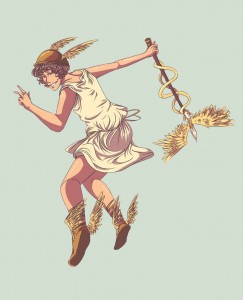 Hermes (Mercury) Greek God - Art Picture by p-oty
Hermes (Mercury) Greek God - Art Picture by p-otyAres was imprisoned, for about a year, by the twin giants Aloades into a bronze cauldron. The resourceful god managed to free him and bring him back to Mount Olympus. When Zeus burned Semele, Hermes was assigned to transfer the small Dionysus from Evia to the Nymphs of the mountain Nysa. Apollo confided little Asclepius, son of his unfaithful lover Koronida, in the hands of Hermes. Jonah, abandoned at the rocks of Acropolis (from his mother Creusa) was transferred by Hermes to the oracle of Delphi, in order to be close to his father Apollo.
The transfer of Phrixus and Elli on the Aegean was also a success thanks to Hermes and the golden ram he had given to Nefeli. Odysseus (Ulysses), in the period that he was located on the island of Circe, also accepts the help of Hermes. The young god transformed himself and revealed to him the witch’s plans, giving him also the antidote to their magic.
 Hermes (Mercury) Greek God - Art Picture by Essence_of_Myself
Hermes (Mercury) Greek God - Art Picture by Essence_of_MyselfOnce again, on the island of Calypso now, Hermes tries to save Odysseus again. With the instigation of Zeus, he intervenes and notifies Calypso about the, relative to the fate of Odysseus, decision of the gods.
Perseus, like all the other heroes, also receives the support of Hermes. Committed to acquire Gorgon’s head and desperate from the huge labor that he undertook, decides to ask the help of Hermes. The god is giving him a diamond sickle and helps him to kill Medusa and cut off her head. Hermes also plays a very important role in the incidents that are prior to, during and at the end of the Trojan War.
Originally, Hermes was the one who led the three goddesses to Mount Ida, where Paris chose the one that was the most beautiful.
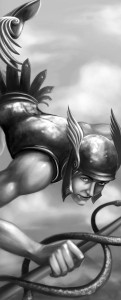 Hermes (Mercury) Greek God - Art Picture by Alayna
Hermes (Mercury) Greek God - Art Picture by AlaynaThen Hermes was again the one who stole the real Helen and hid her in Egypt. Hermes also was the one who was sent by the gods to Paris and informed him about their decisions. During the Trojan War, he was proposed by the gods to steal the body of Hector, which was abused by Achilles. Shortly after, he again, having transformed into a mortal, accompanied the old man Priamos to the tent of Achilles to ask the dead body of his son Hector.
Finally, at the end of the Trojan War, Hermes again descended to Mycenae, to warn Aegisthus for what he was destined to suffer if he decided to marry Clytemnestra.
The actions of Hermes to the Underworld as an intermediary and savior are not inferior to his actions as a messenger.
Hermes stole the dead Alcmene, mother of Heracles, and brought her to the island of Makaron. Hermes again helped Heracles, who wanted to raise the Cerberus to earth. Hermes again brought back Persephone to the world, daughter of Demeter who was grabbed by the god of the Underworld, after he persuaded Hades to let her go.
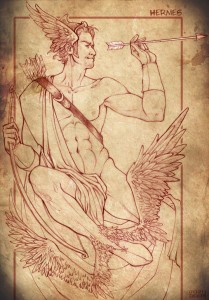 Hermes (Mercury) Greek God - Art Picture by Stregatto10
Hermes (Mercury) Greek God - Art Picture by Stregatto10Hermes invited with his wand the souls of the dead suitors of Penelope, that laid in the palace of Odysseus, and led them to the Underworld. The myths surrounding the life and action of Hermes, as also the facts on which he participated, converge on the outline of a single character. The variety and richness of the factors that his personality has, degrades his appearance as a god in a good way. In other words, he embodies virtues and defects of a mortal man.
Cunning and clever, agile and tricky, resourceful and wily, dreamer, thief and flatterer, energetic and restless are some of his key features.
Apart from the responsible services and serious missions offered by the illegitimate son of Zeus, Hermes was also an incorrigible prankster. Once, in order to amuse himself, he had grabbed the clothes of his mother and some other nymphs while they did their bath. Also in the past, he had managed to fool Hera making her suckle another illegitimate son of Zeus, Heracles.
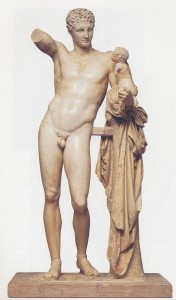 Greek God Hermes (Mercury) Statue - Hermes of Praxiteles
Greek God Hermes (Mercury) Statue - Hermes of PraxitelesThe ancient Greeks had yielded too many contrivances in Hermes. To him were attributed the discovery of fire, the construction of the first lyre and the flute. For the people of ancient Greece, Hermes was the god of speech, eloquence, the inventor of letters and numbers.
He also was the one who had given the first woman, Pandora, human voice and made her speak with fake, fraudulent and bad words. As the son of one of the Pleiades, Hermes was also associated with astronomy, and considered the initiator of weights and measures and the patron of commerce.
As an ideal runner, Hermes, along with Eros and Heracles were characterized as gods of the athletic youth, gymnastic exercises and wrestling arenas. From the incident, initially of theft and then rearing and caring the fifty heifers of Apollo, the son of Zeus was associated with the deceitfulness, the exploitation and livestock and was the patron of thieves and shepherds.
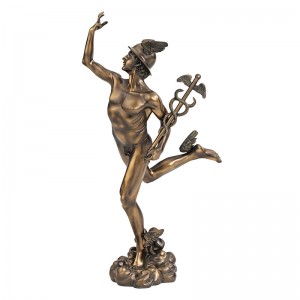 Greek God Hermes (Mercury) Statue
Greek God Hermes (Mercury) StatueHermes was a flirty and quite lively god. Many women, not only goddesses but also mortals, satisfied his erotic desires and gave him many children.
From his union with the nymph Driopi, his goat-footed son, Pan was born, while from another nymph he acquired Daphne. He also had a son, Autolycus, by his association with the Chioni (or Filonida) and another son, Myrtilos from Klymeni (or Phaethousa). From Akallia (daughter of Minos) he acquired Kydonas and from Alkidameia the Vounos.
Hermes also had other sons, Arpalykos (to whom he had even taught the art of stealing) and Abderos. By Aglafro (daughter of Cecrops) he had acquired the Kyrikas, and he had also joined with the Apimosyni. Finally, he was always in love with Aphrodite (he had even confided this to Hephaestus when he had caught her in bed with Ares), but never managed to acquire her.
Please leave a comment if you liked this article 🙂
All pictures are also uploaded in Albums on the Greek Mythology Pantheon page on Facebook, visit us at :


2 COMMENTS
I want to learn more about this things
Just one name that counters one of the last statements made in your article. Hermaphroditus. Double gendered offspring of Hermes and Aphrodite.